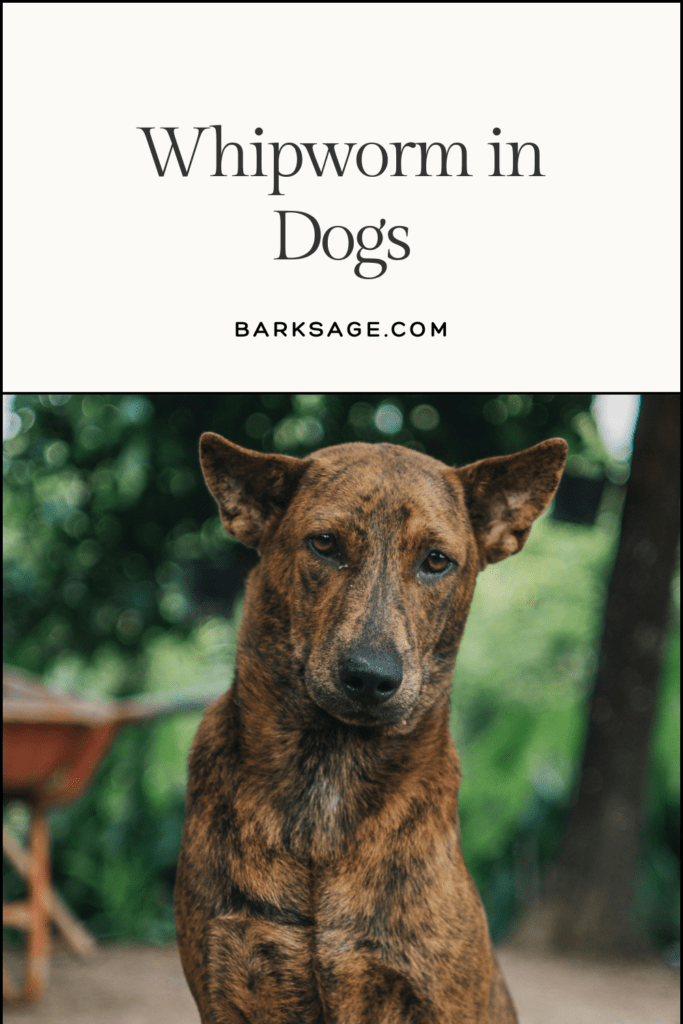
Did you know that approximately 10% of dogs worldwide are affected by whipworm infection? Whipworms, scientifically known as Trichuris vulpis, are a common intestinal parasite that can cause significant health issues for our furry friends. These worms, measuring about 3-5 centimeters in length, reside in the large intestine of infected dogs, feeding on blood and tissues.

Create an image of a whipworm infestation in a dog’s intestine, with the parasites clinging to the intestinal lining and causing inflammation and discomfort. Show the symptoms of whipworm, including weight loss, diarrhea, and dehydration. Use muted colors to emphasize the serious nature of the condition and the dog’s distress. Additionally, show ways that owners can prevent a whipworm infection, such as proper hygiene and cleaning up after their pets.
Whipworm eggs are shed in the feces of an infected dog and can survive for years in the environment, making them highly resilient and difficult to eliminate. Once ingested by another dog, the eggs hatch into larvae and mature into adult whipworms within the intestine.
In this article, we will explore the world of whipworm in dogs, discussing the symptoms to watch out for, treatment options, and preventive measures necessary to keep our furry companions healthy and happy.
Key Takeaways:
- Whipworms are a common intestinal parasite, affecting approximately 10% of dogs worldwide.
- They reside in the large intestine and feed on blood and tissues.
- Whipworm eggs can survive in the environment for years, making them difficult to eliminate.
- Early detection and treatment are essential to prevent discomfort and potential health complications in infected dogs.
- Proper hygiene and regular deworming are crucial in preventing whipworm infestations.
Identifying Whipworm in Dogs: Symptoms and Diagnosis
When it comes to the health of our canine companions, it’s essential to be aware of potential parasitic infections like whipworm. Canine whipworm, scientifically known as Trichuris vulpis, is one of the most common intestinal parasites affecting dogs. In this section, we will explore the symptoms of whipworm infestation and the importance of accurate diagnosis through fecal exams.
Common Symptoms of Whipworm in Dogs
Identifying whipworm in dogs can be challenging as some infected dogs may show no symptoms at all. However, when symptoms are present, they typically include:
- Chronic or recurrent diarrhea
- Bloody diarrhea
- Weight loss
- Anemia
- Abdominal pain or discomfort
If your dog experiences persistent or recurring gastrointestinal issues, it’s vital to consult with a veterinarian for proper diagnosis and treatment.
Fecal Exams for Accurate Diagnosis
The diagnosis of whipworm infection in dogs is primarily done through fecal exams, which involve examining a sample of your dog’s feces under a microscope. The Companion Animal Parasite Council (CAPC) recommends regular fecal exams as part of routine pet care, especially for dogs at risk of intestinal parasites.
Fecal exams help identify the presence of whipworm eggs or other intestinal parasites in the dog’s feces. It is important to note that whipworm eggs are much denser than other worm eggs, which can make them difficult to detect. Therefore, multiple fecal exams may be necessary to increase the accuracy of the diagnosis.
Regular fecal exams not only aid in diagnosing whipworm infection but also help identify other intestinal parasites that may be affecting your dog’s health. This comprehensive approach allows veterinarians to develop appropriate treatment plans and ensure the overall well-being of your furry friend.
By staying vigilant about the symptoms of whipworm in dogs and investing in regular fecal exams, you can help your canine companion lead a healthier and parasite-free life.
Symptoms of Whipworm in Dogs
| Symptom | Description |
|---|---|
| Chronic or recurrent diarrhea | Persistent episodes of loose stools |
| Bloody diarrhea | Presence of blood in the stool |
| Weight loss | Unexplained loss of body weight |
| Anemia | Low red blood cell count |
| Abdominal pain or discomfort | Persistent discomfort in the abdominal area |
Treatment and Management of Whipworm Infection in Dogs
Whipworm infection in dogs can cause various clinical symptoms, including gastrointestinal issues and discomfort. Identifying and treating whipworms promptly is crucial to ensure the health and well-being of our canine companions.
Treatment Options
When it comes to whipworm treatment, there are several options available. One common approach is the use of anthelmintic medications, which are specifically designed to target and eliminate parasitic worms like whipworms. These medications are often administered orally and work by killing adult worms in the dog’s intestines.
In addition to targeting adult worms, some medications can also inhibit the growth and reproduction of whipworms by eliminating microscopic eggs that are shed in the dog’s feces. This is especially important in preventing the reinfestation of whipworms in dogs.
It’s worth noting that treatment for whipworm infection may require multiple rounds of medication to effectively eliminate the parasites. This is because some medications may not be effective against microscopic eggs, which can hatch and lead to the development of new adult worms.
Preventive Measures
Prevention plays a vital role in the management of whipworm infection in dogs. One preventive measure involves regular fecal exams to detect the presence of whipworm eggs in the dog’s feces. By identifying and treating infections early on, we can minimize the risk of whipworm infestations and the associated symptoms.
Heartworm medications, which are commonly used to prevent heartworm disease, can also provide protection against whipworms. Certain heartworm medications have the added benefit of controlling various intestinal parasites, including whipworms, by targeting the microscopic eggs.
Maintaining good hygiene practices, such as regularly cleaning up after our dogs and providing a clean living environment, can further reduce the risk of whipworm infection. It’s essential to remember that whipworm eggs are resilient and can survive in the environment for extended periods, so diligence in keeping the environment clean is crucial.
The Role of Heartworm Medications
Heartworm medications, such as those containing active ingredients like ivermectin or milbemycin, are effective in preventing not only heartworm disease but also certain intestinal parasites like whipworms. These medications work by interfering with the growth and development of whipworm eggs, ultimately preventing the formation of adult worms in the dog’s intestines.
Regular administration of heartworm medications according to the manufacturer’s instructions is vital to ensure adequate protection against whipworms and other parasitic worms. It’s important to consult with a veterinarian to determine the most appropriate heartworm medication for your dog.
It’s important to note that while heartworm medications can provide preventive benefits against whipworms, they may not be solely sufficient to treat an active whipworm infection. In such cases, additional treatment with anthelmintic medications may be necessary.
Conclusion
In conclusion, whipworm in dogs is a common intestinal parasite that can cause discomfort and health issues for our canine companions. It is important for dog owners to be aware of the symptoms associated with whipworm infection, such as bloody diarrhea and intestinal discomfort. Timely diagnosis through repeated fecal exams is crucial in identifying and treating whipworm infestations.
By following proper treatment protocols, dog owners can effectively manage whipworm infestations and provide core care for their pets. Treatment options may include the use of specific medications that target whipworms and help eliminate these parasites from the dog’s system. Additionally, preventive measures such as regular deworming and maintaining a clean environment can help reduce the risk of whipworm and other intestinal worm infections, including hookworm.
By prioritizing the health and well-being of our dogs, we can ensure they live a happy and parasite-free life. Regular visits to the veterinarian for check-ups and monitoring, as well as adhering to preventive measures, will greatly contribute to maintaining the overall health of our furry friends. By staying vigilant and proactive in providing core care for our dogs, we can help protect them from the harmful effects of whipworm and other intestinal parasites.


